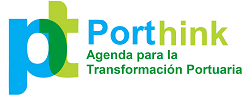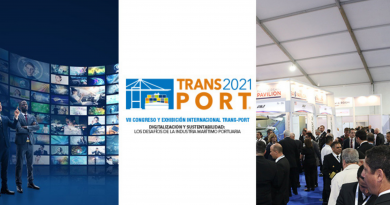“Technological solutions must reinforce the strategic role of ports in global supply chains,” concluded panel at Smart Digital Ports Europe Conference
At the Smart Digital Ports of the Future Europe Conference, held from September 24 to 25, 2024, in Rotterdam, Netherlands, various panels and plenary sessions brought together key representatives from the maritime and port industries. The panel titled “The Ins and Outs: Port Call Optimization, Traffic Management, and Supply Chain Integration” featured four distinguished panelists: Umesh Kurlekar, Vice President and Head of Maritime Practices at Kale Logistics Solutions (KALE); Kevin Kruijthoff, Managing Director of Product & Technology at Routescanner; Dr. Jérome Besancenot, Head of Digital Transition at Haropa Port; and Maxim Neiser, Project Manager at HPC Hamburg Port Consulting. Bugra Bilginer, Managing Director of London Port & Logistics Consulting, moderated the session.
The panelists discussed the various factors and challenges involved in coordinating with the port supply chain to ensure the smooth movement of cargo from vessels to trucks and trains. They emphasized that solutions for accurately managing, predicting, and scheduling cargo flows are critical for reducing congestion and emissions, maintaining operational efficiency, and reinforcing ports’ strategic role in global supply chains.
Mr. Kurlekar showcased the company’s deep maritime and port industry expertise. He highlighted their single-window solutions, including the Port Community System (PCS) and Maritime Single Window (MSW), which have been operational for over 15 years in more than 40 countries. These systems are implemented in over 150 global airports and ports and have established Kale as a significant player in international associations such as TIACA, IPCSA, IAPH, and AAPA.
Kale’s single-window solutions primarily connect maritime and landside operations, streamlining communication and data exchange among the diverse stakeholders in the port community. Their CODEX Port Community System offers a range of services tailored to specific business verticals, such as export and import, vessel size, and transshipment needs. Key stakeholders include ports, terminals, customs, railway operators, agencies, and shipping lines.
Mr. Kurlekar emphasized the critical challenge of integrating data from various stakeholders, which requires standardization and harmonization. At the same time, he outlined the immense benefits that arise when information flows smoothly across the port supply chain. The Port Community System (PCS) is pivotal in facilitating this data integration, laying the foundation for further initiatives towards decarbonization and sustainability within port operations.
During the panel, Kurlekar shared several case studies, such as implementing the Maritime Single Window in Malaysia. This project involves digitizing vessel operations for more than 500 organizations, connecting over 90 terminals and 24 ports, and supporting more than 300 private ferries and 300 weekly vessel services.

In the Q&A session, an audience member asked about the first steps for ports and countries that have yet to implement such solutions. With technologies like Port Call Optimization, Truck Appointment Systems, PCS, and MSW available, what should be the initial focus?
The HAROPA Port representative underscored that implementing a PCS should be the first step, as it serves as the core system. To optimize processes, it is essential to have data and an efficient way to share it among stakeholders. While additional data from IoT devices may complement these efforts, digitalizing processes through a PCS is fundamental. Umesh Kurlekar also agreed with it, emphasizing the importance of the Maritime Single Window, mandated by the IMO, as a complement to the PCS. However, he reiterated that PCS implementation should be the primary focus.
The other panelists agreed that the PCS is the critical starting point. They also stressed the need for accessible data and streamlined business processes involving all port community stakeholders. There is no one-size-fits-all approach. Different countries and regions have varying needs and conditions. Therefore, it is crucial to assess the local context and adopt practical, incremental changes that can deliver tangible benefits to the entire port community. Additionally, they highlighted the importance of managing relationships and change, ensuring that users of the solution understand its value and have their needs addressed.
Source: Porthink
________________________________________________________________________________________________________________
Kale Logistics Solutions, a trusted cloud-based tech solutions provider for fortune 500 companies in the logistics industry. Kale is focused on providing cutting edge technology solutions to the Global Logistics and Supply Chain network. Its wide portfolio of solutions comprising enterprise ERP systems and community platforms is transforming businesses of more than 500 customers worldwide. Kale has been awarded several industry accolades for its innovative solutions in the Logistics Industry. Owing to extensive experience and thorough knowledge pertaining to the Logistics domain and being the only Logistics focused tech provider, Kale has been recognized as ‘Best Tech Provider’ for last many consecutive years at prominent International Industry forums. Kale’s solutions help Freight Forwarders, NVOCC, LCL Consolidators, Shipping Line Agents, Stevedores, Surveyors, Container Freight Stations, Equipment Control Providers, Vessel Charterers, Custom House Agents, 3PL, Warehouse Operators, Transportation Providers, other Logistics Service Users and Airport Cargo Terminal Operators achieve faster growth, standardized processes and operational efficiencies. An active partnership with key industry bodies and customers keep Kale at the forefront of emerging trends.
For more information, please visit www.kalelogistics.com






